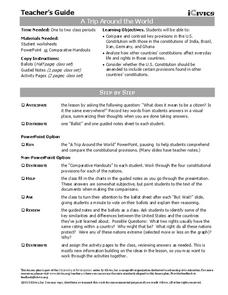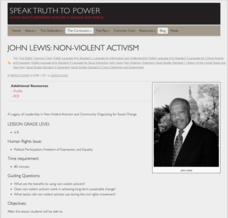Center for Civic Education
Citizenship Schools and Civic Education During the Civil Rights Movement and in the Present
Your young historians will discover the importance that citizenship education has played in the social progress of the United States as they learn about early efforts to discourage African Americans from voting in the 1960s.
Carolina K-12
African Americans in the United States Congress During Reconstruction
The Civil Rights Act of 1866, which granted citizenship to all males in the U.S., resulted in the first African Americans to be elected to Congress. Class members research 11 of these men, the challenges they faced, and craft...
Museum of Tolerance
The Role of Citizens in a Participatory Democracy
Groups research participatory democracies and compare the role and rights of citizens in ancient history with those in recent U.S. history. Guided by a series of questions, individuals compose a persuasive essay in which they discuss the...
Center for Civic Education
Historical Analysis of Constitutional Amendments
Each of the 27 Amendments to the U.S. Constitution were adopted within specific economic, political, social or cultural, and international contexts. As part of their Constitution Day/Week studies, seniors investigate these factors for...
Center for Civic Education
Matching Game with the US Constitution
In September we celebrate Constitution Day. Begin the celebration with a grand conversation about the US Constitution. Follow up the in-depth discussion with a learning game in which scholars match terms to images such as the...
National Endowment for the Humanities
Slavery and the American Founding: The "Inconsistency Not to Be Excused"
High schoolers examine slavery in the revolutionary and colonial eras of the United States. In this slavery lesson, students investigate the presence of slavery in early America, the language of the Constitution, and the intent of the...
Curated OER
Little House in the Census: Almanzo and Laura Ingalls Wilder
How would you use census data from 1880-1900? Here are a set of ways you can incorporate the book Little House on the Prairie and US census data from that time period. Learners will research the validity or the book based on factual...
Education World
Now Let Me Fly -- A Black History Reader's Theater Script
Young scholars study African American history, Jim Crow laws, and seperate but equal statutes by performing a Reader's Theater script. They perform Marcia Cebulska's, Now Let Me Fly, which may be requested online.
State Bar of Texas
Texas v. Johnson
If you saw a person burning an American flag, how would you feel? Scholars analyze the concept of freedom of expression and speech with the Supreme Court case Texas v. Johnson. A short video clip creates open discussion in pairs on the...
State Bar of Texas
White v. Regester
One vote doesn't really matter, right? Class members investigate the concept of voter rights and restrictions using the 1973 Supreme Court case White v. Regester. They view a short video and work in pairs to analyze how people create...
iCivics
A Trip Around the World
How do the rights of citizens in other countries, such as India, Germany, Brazil, and Iran, compare to those of Americans? Take a closer look at the provisions of various foreign constitutions, and compare and contrast the protections...
iCivics
For The President, All In A Day's Work
How does the president of the United States get the authority to exercise his/her duties? What responsibilities and tasks go into a hard day's work for the president? Here is a lesson plan that includes several instructional materials...
iCivics
Wanted: A Just Right Government
What type of government did American colonists gain and seek after gaining their independence after the Revolutionary War? Here is lesson that will guide your young learners through the new nation's progression from the Articles of...
Rutgers University
How the Allies Won World War II: Island-hopping in the Central Pacific
Using primary source documents, young historians explore the strategies the US used to defeat Japan during WWII. They also learn about the American military experience, and innovations that changed the style of warfare. Students benefit...
John F. Kennedy Presidential Library & Museum
Analyzing the Inaugural Address
Get high school historians to step outside their own shoes by responding to JFK's inaugural address from the perspective of a civil rights activist, a soviet diplomat, or a Cuban exile. After a class discussion about the address, the...
Center for Civic Education
The Power of Nonviolence: What Is Nonviolence? What Does It Cost?
Your young learners will delve into the language of primary source documents in order to identify the characteristics, benefits, and costs of nonviolence. The lesson includes a mix of activities, including an anticipatory activity,...
Speak Truth to Power
John Lewis: Non-Violent Activism
After comparing and contrasting non-violent and violent social movements, your young historians will take a closer look at the work and influence of John Lewis on the civil rights movement. They will then choose a current social justice...
Center for Civic Education
The Equal Rights Amendment in the 1970s and Today
Discover the fascinating history of the Equal Rights Amendment and discuss the major implications and considerations associated with it today. Here you will find background information on the topic, a graphic organizer summarizing...
State Bar of Texas
Schenck v. US
Freedom of speech is absolute—or is it? The Supreme Court case Schenck v. United States has learners research what free speech really looks like. A short video along with paired work creates open discussion and thought on what speech is...
Center for Civic Education
Constitution Day Rap
Engage your class while learning about the US Constitution with this fun primary grade social studies lesson. After viewing a picture of the US Constitution, young learners piece together a US flag using stars and stripes with facts...
State Bar of Texas
Plessy v. Ferguson
Where did separate but equal originate and what does it mean? Scholars investigate the Supreme Court Case Plessy v. Ferguson. Using a short video clip, they analyze the impact the decision of legal segregation had on society in 1896....
State Bar of Texas
Sweatt v. Painter
Is separate but equal actually equal? The 1950 Supreme Court case Sweatt v. Painter discusses the law of segregation and inequality. Scholars investigate the impact of the case on the desegregation of public schools across the nation...
State Bar of Texas
Brown v. Board of Education
You walk each day over 20 blocks to school as a 9-year old because the color of your skin does not allow you to attend a school in your own neighborhood. Scholars use the 1954 Supreme Court case Brown v. Board of Education to investigate...
State Bar of Texas
Wisconsin v. Yoder
How far does freedom of religion truly go? The 1972 Supreme Court case Wisconsin v. Yoder introduces the concept of the free exercise clause of the First Amendment. Individuals examine the case with a short video and open discussion. To...

























